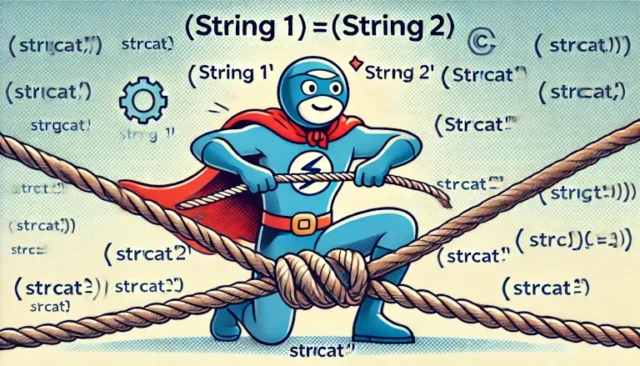String manipulation is a crucial skill in C programming, particularly when dealing with text data. One common task is concatenating two strings, and strcat() is a built-in function that makes this process straightforward. In this guide, we’ll delve into how to use strcat() in C to concatenate two strings effectively. We will also explore the syntax, provide a step-by-step explanation, and highlight common issues and solutions related to using strcat().
By the end of this guide, you’ll have a solid understanding of string concatenation in C, enhancing your skills in text manipulation.
What is String Concatenation in C?
String concatenation is the process of joining two strings end-to-end to create a single string. In C programming, strings are essentially character arrays. The strcat() function, defined in the string.h library, allows you to combine two strings easily without manually iterating over their elements.
Why Use String Concatenation?
- Building Complete Messages: Often, you need to construct complete messages by combining different pieces of text.
- Data Aggregation: Combine user inputs or different strings for processing and output.
- Dynamic Content: Make the program more dynamic by creating strings based on different variables.
How Does strcat() Work?
strcat() takes two arguments—destination string and source string—and appends the source to the destination.
Syntax:
char *strcat(char *destination, const char *source);destination: The string to whichsourcewill be appended.source: The string to be added to the destination.
Note: The destination string must have enough space to accommodate the combined result; otherwise, it may lead to undefined behavior or memory issues.
Step-by-Step Guide to Using strcat()
Example Program to Concatenate Two Strings
Consider the following example where we concatenate two strings using strcat():
#include <stdio.h>
#include <string.h>
int main() {
char destination[50] = "Hello, ";
char source[] = "World!";
// Concatenating source to destination
strcat(destination, source);
// Printing the result
printf("Concatenated String: %s\n", destination);
return 0;
}Explanation:
- Header Files: The program includes
<string.h>to use thestrcat()function. - Destination String:
char destination[50] = "Hello, ";allocates enough space to accommodate the concatenated result. - Source String: The
source[]contains the string to be appended. - Function Call:
strcat(destination, source);appends “World!” to “Hello, “, resulting in “Hello, World!”.
Output
Concatenated String: Hello, World!Common Issues When Using strcat()
1. Insufficient Space in Destination String
One of the common mistakes is not allocating enough memory for the destination string, leading to buffer overflow or undefined behavior.
Solution:
- Always ensure the destination string has enough space to hold the concatenated result, including the null terminator.
2. Concatenation Order
New programmers often misunderstand which string gets appended to which.
Solution:
- Remember that
strcat(destination, source)appends source to destination. Always make sure you are passing the strings in the correct order.
3. Memory Management with Dynamic Strings
If you are working with dynamic memory allocation using malloc(), you need to ensure that enough memory is allocated to avoid runtime errors.
Example with malloc:
#include <stdio.h>
#include <stdlib.h>
#include <string.h>
int main() {
char *destination = (char *)malloc(100 * sizeof(char));
if (destination == NULL) {
printf("Memory allocation failed\n");
return 1;
}
strcpy(destination, "Dynamic ");
char source[] = "Memory";
strcat(destination, source);
printf("Concatenated String: %s\n", destination);
free(destination);
return 0;
}Explanation:
- Memory Allocation: Allocate sufficient memory using
malloc(). - Memory Freeing: Use
free(destination)after use to avoid memory leaks.
Best Practices for Using strcat()
- Allocate Sufficient Memory: Always make sure the destination array is large enough to hold the concatenated result.
- Avoid Overlapping Strings: Ensure that the source and destination strings do not overlap, as this can cause unexpected behavior.
- Use Safer Alternatives When Needed: For more safety, consider using
strncat(), which lets you specify the number of characters to append, minimizing risks of buffer overflow.
Example of Safer String Concatenation with strncat()
#include <stdio.h>
#include <string.h>
int main() {
char destination[15] = "Hello, ";
char source[] = "World!";
// Using strncat to limit concatenation
strncat(destination, source, sizeof(destination) - strlen(destination) - 1);
printf("Concatenated String: %s\n", destination);
return 0;
}In this example, strncat() ensures that only enough characters are appended to prevent overflow.
Potential Pitfalls and Solutions
Buffer Overflow
A common pitfall is buffer overflow, where the destination buffer isn’t large enough to store the concatenated result, causing unpredictable behavior or even program crashes.
Solution: Always calculate the length of both strings and allocate enough memory for the destination, considering the null terminator.
Using Dynamic Strings
When concatenating strings of unknown length, use dynamic memory allocation to prevent memory-related issues.
Solution: Use malloc() or realloc() to dynamically allocate enough space for the destination string.
Conclusion
Using strcat() to concatenate strings in C is an effective way to handle string manipulation. Understanding the requirements for memory allocation and the correct use of arguments can prevent common pitfalls like buffer overflow. We explored how to properly use strcat(), provided sample code, discussed common issues, and recommended best practices.
By mastering string concatenation in C, you enhance your ability to handle complex text data operations, making your programs more versatile and efficient.
